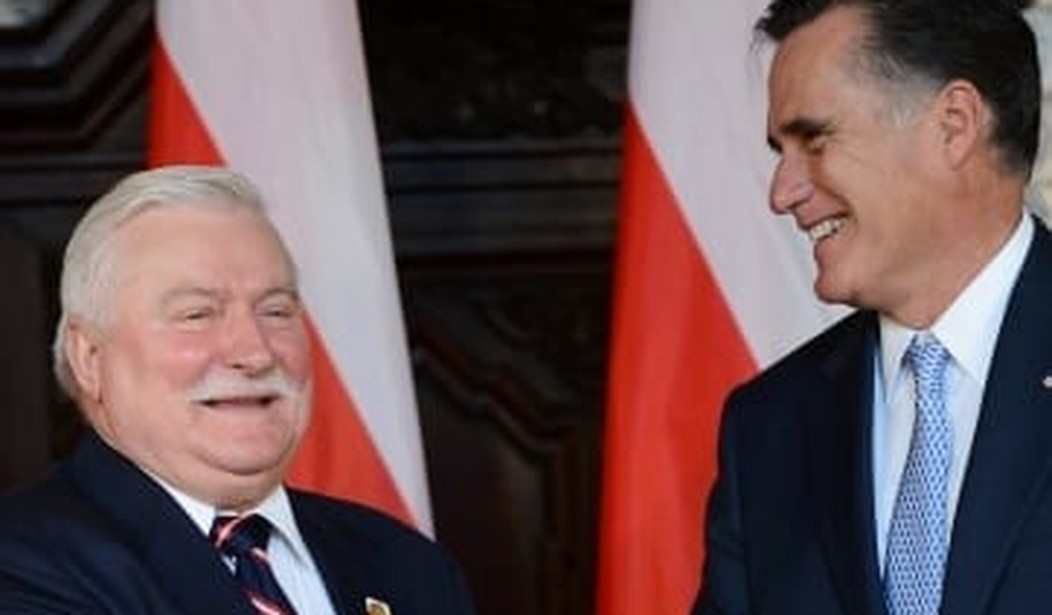It seemed like a pretty straightforward photo-op. After a meeting with Polish Prime Minister Donald Tusk at Gdansk’s historic town hall, Mitt Romney stopped to talk to a large and enthusiastic crowd of local residents of this Baltic port city made forever famous as the birthplace of “Solidarity.” But even here, five thousand miles away from America, this informal occasion ended up feeling like the campaign trail back home, with some of the gathered chanting “Obama” while a few members of the New Right Congress held up a banner with a likeness of Ron Paul and a caption “Polish choice.” Romney campaign workers unsuccessfully tried to obscure the banner with their red umbrellas.
At least that’s what the media focused on. If, as P.J. O’Rourke once said, journalists follow the president waiting for him to take a fall or say the F-word, Romney certainly got the foretaste of the high office and the scribes got their stumbles and profanity, or at least an “ass.”
Romney’s overseas trip was meant to enhance his foreign policy cred, in what has otherwise been a very domestically focused election campaign. The choice of the destinations, the tripod of old and new allies in Europe and the Middle East, was carefully chosen to contrast and compare Mitt’s approach with that of President Obama, who has managed to repeatedly snub all three.
Poland, the last leg of Romney’s trip, is becoming a serious player in European politics, due to its size as well as the robustness of its economy, which has so far bucked the doom-and-gloom trend of the rest of the continent. Polish elites in general are both Atlanticist and European in their outlook; the sentiments that often don’t sit easily together. The population, disenchanted by the involvement in both Iraq and Afghanistan and by the continuing refusal of the U.S. to grant them the same visa treatment as accorded to other allies, is increasingly cynical of America; a great pity for a country with such rich history of trans-Atlantic connections and sympathies. “The relations with the U.S. are at their lowest point in twenty years,” observed Polish daily Rzeczpospolita. “It can only get better.”
“Why Poland?” asked Polish commentators Michał Kolanko and Paulina Kozłowska. “Because President Obama withdrew from the proposed missile shield and announced it on September 17 [the anniversary of the Soviet invasion of Poland in 1939]. Because Obama misspoke about the ‘Polish death camps.’ The Romney campaign decided that Poland will be a good destination as it will serve to remind of the fact that Obama ignores allies and forgets about them. … Romney’s visit is to show that in contrast to the current president, Romney will look after allies, even smaller ones like Poland.”
Romney needed some good press after critiquing the organization of the London Olympics, never a good way to win friends and influence people, even if it’s the same Olympics whose opening ceremony glorified the British public health system. (When I think of the UK’s contribution to the world I tend to think of parliamentary democracy, limited government, industrial revolution, abolition of slavery, and the fight against Nazism and communism. But maybe none of these are easily translated into a pageant involving Mr. Bean.)
After London, meeting with Lech Walesa must have seemed God-sent. Walesa, the leader of the “Solidarity” movement, Obama’s fellow Nobel Peace Prize winner, and a former president of independent Poland, is a perfect exemplar of the old Biblical adage that no one is a prophet in his own country. A controversial and polarizing figure at home, the former electrician turned a living symbol of the victorious struggle against communism nevertheless still retains some of his old-time mystique abroad. If Romney was hoping for some of it to rub off onto him, Walesa did not disappoint.
“He radiates values,” Walesa said about his American guest. “I see many similarities between the two of us. … Mitt Romney made a good impression on me.”
“It’s too early to declare support for this candidate. … I can’t get involved in internal American affairs,” Walesa protested too much before finally letting the world know what he really thinks: “I see [in Romney] a man who has the same philosophy as me – that the world should be build on values. … I can’t say the same about the other candidate [Obama].”
Had Romeny flown back home from Gdansk, his trip would have ended on a high note. But there were still a few important engagements awaiting in Warsaw, including a meeting with the American Enterprise Institute alumnus and current foreign minister Radek Sikorski, as well as a major foreign policy speech designed, in the breathless prose of the London Guardian, to “rekindle cold war spirit”.
As it turned out, the most influential Polish daily Gazeta Wyborcza opined that all that Americans will remember from Romney’s trip to Poland will be Walesa and the “Kiss my ass” comment by Romney’s media man Rick Gorka.
In Gorka’s defense, Romney had just spoken to war veterans and put flowers at the Tomb of the Unknown Soldier, a monument made all the more sacred by the sheer number of unknown soldiers in Poland’s bloody history. Timing was poignant too, on the eve of the anniversary of the 1944 Warsaw Uprising. When the traveling media started shouting questions at Romney about gaffes, breaking the spell of what has otherwise been a quiet and somber event, Gorka snapped: “Kiss my ass, this is a holy site for the Polish people. Show some respect.” Ill-advised but understandable.
Nomen omen, as Romans used to say; Gorka’s name means “little mountain” in Polish. Romney’s overseas foray might have been somewhat of an uphill affair, but let’s hope the view from the top will be worth it.









Join the conversation as a VIP Member